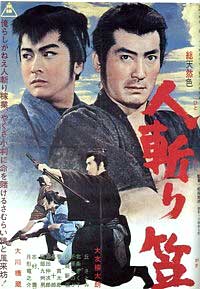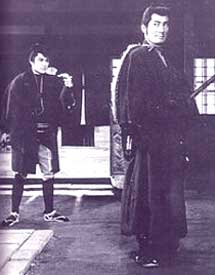 Bodyguard Samurai; aka, Bodyguard Swordsmen; aka, Vanquished Foes (Hitokiri gasa, 1963) stars Hashizo Okawa as Tota Hayata of Kofu, a young spunk of a gangster. When he fights, he does so sloppily & boastfully, as such a toseinin or wandering gambler probably would. But he manages to get a job done. Bodyguard Samurai; aka, Bodyguard Swordsmen; aka, Vanquished Foes (Hitokiri gasa, 1963) stars Hashizo Okawa as Tota Hayata of Kofu, a young spunk of a gangster. When he fights, he does so sloppily & boastfully, as such a toseinin or wandering gambler probably would. But he manages to get a job done.
Ryotaro Otomo co-stars as the ronin Jinju the Killer, a man of skill & humor. His sword is for hire. He charges one ryo per head. In one confrontation, surrounded by a dozen men, he tells them sadly, "I'm sorry you're so unlucky," then proceeds to beat the crap out of them using the back of his sword.
The "back of the sword" duel in which lives are spared by a heroic figure is a standard feature of young adult or children's chambara swordfight films of the 1950s & 1960s, & often seen in films starring Hashizo Okawa whose films were aimed at youth.
Hashizo was one of many such "youth performers" who were a major factor in Toei Studio's enormous commercial success beginning in the 1950s & lasting through most of the '60s.
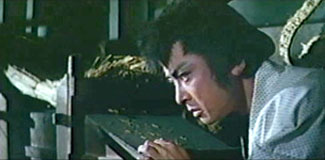 Very young actors like Kinnosuke Nakamura, Chiyonosuke Azuma, Kotaro Satomi, & Hashizo would be cast alongside veterans, powerful character players like Ryotaro Otomo & Ryunosuke Tsukigata. Very young actors like Kinnosuke Nakamura, Chiyonosuke Azuma, Kotaro Satomi, & Hashizo would be cast alongside veterans, powerful character players like Ryotaro Otomo & Ryunosuke Tsukigata.
The youth-actors were cast either in major support roles in the films starring veterans, some of whom began in the silent era, or as the lead player with one or two long-established veterans backing them up.
Of the youth stars Hashizo & Kinnosuke were leagues above the rest in popularity, & were Toei's biggest cash cows in the 1960s. Kinnosuke over time escaped the "young film idol" for teenagers category & made thoroughly adult films as well as still appearing in films for younger viewers.
But Hashizo was so damnably pretty, with that veritable glow-in-the-dark smile, he was lucky not to be cast perpetually as the jolly "singing samurai" skipping along the Tokaido Road, to be given the occasional semi-serious role.
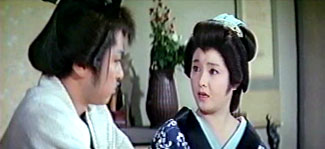 Very rarely Hashizo would appear in a totally serious film, Daisuke Ito's The Retaliation of Gonza (Kono kubi ichiman-goku, 1963) most noteworthy for severity & artistic quality, but not so noteworthy for box office receipts. Very rarely Hashizo would appear in a totally serious film, Daisuke Ito's The Retaliation of Gonza (Kono kubi ichiman-goku, 1963) most noteworthy for severity & artistic quality, but not so noteworthy for box office receipts.
Even as Hashizo approached middle age & his film career was swapped for a television career, he was stuck in a happy-go-lucky long-running samurai-detective role.
So in any Hashizo film, expect something largely upbeat & child-safe. But also expect superior character roles surrounding smiling Hashizo, & some unintentionally whimsical but appealing emotionalism & intense gazes from most of the actors especially Hashizo who is always a beauty worth looking at on the screen. He turns in the best performances he can muster, taking his responsibility to entertain as an important process, though not so much out to prove his greatness as an actor.
I always enjoy Hashizo's films despite that they're mostly aimed young, & I even appreciate how thoroughly upstaged he is by mature actors, by Ryotaro Otomo & Ryunosuke Tsukigata in Bodyguard Samurai.
Though Ryotaro Otomo's Jinju is a sweetheart always apt to spare people & thereby fail to collect his one ryo per head, Ryunosuke Tsukigata plays a menacing killer, a samurai likened Heiju the Devil, vs. Jinju the Buddha.
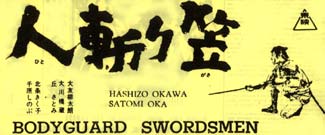 Tsukigata is not the most convincing swordsman of the three lead actors; nevertheless, he makes quite a grand bad guy. Otomo as Jinju fights more convincingly & with considerable humor, reminiscent of Toshiro Mifune's famous character in Kurosawa's Yojimbo. Tsukigata is not the most convincing swordsman of the three lead actors; nevertheless, he makes quite a grand bad guy. Otomo as Jinju fights more convincingly & with considerable humor, reminiscent of Toshiro Mifune's famous character in Kurosawa's Yojimbo.
The fight choreography is pleasing to the eye, though often the sword strokes are filmed at an angle that does not convince because you can clearly see the blades missing opponents who fall down anyway. The budget apparently did not permit retakes. The story concludes with a very exciting final battle, so there is no shortage in the action department.
There are supporting performances from the great Takashi Shimura (leader of the Seven Samurai) as the good oyabun (gangster boss) whose group is being squeezed by the bad boss. Other performers include Satomi Oka, Shingo Yamashiro, Kikuko Hojo, Shinobu Chihara, Kusuo Abe, Kantaro Suga & Juro Hoshi.
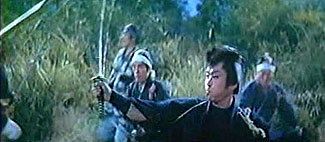 There's a very strong & wise little girl character whose tubercular mother dies. In one scene she stands in front of Tota Hayata to protect him from Jinju the Killer Buddha, which impresses Jinju a great deal. In a primary plot twist, she turns out to be Jinju's kid. There's a very strong & wise little girl character whose tubercular mother dies. In one scene she stands in front of Tota Hayata to protect him from Jinju the Killer Buddha, which impresses Jinju a great deal. In a primary plot twist, she turns out to be Jinju's kid.
Hashizo was really one of the finer samurai players for "family friendly" period films, & his films do not deserve to be so hard to find with English subtitles. Director Sadatsugu Matsuda (also credited as Teiji or Sadaji Matsuda) was active from the 1940s through 1960s, specializing in jidai-geki & chambara, & turned in reliable genre films.
Matsuda's films are poorly recognized in the west, & it's a bit unfortunate he's known mainly for the first two Crimson Bat films, which aren't all that great, as he worked with many of the more interesting actors like the notable newcomer Hashizo Okawa & long-established Ryutaro Otomo, directling extremely fun commercial samurai films.
copyright © by Paghat the Ratgirl
|

